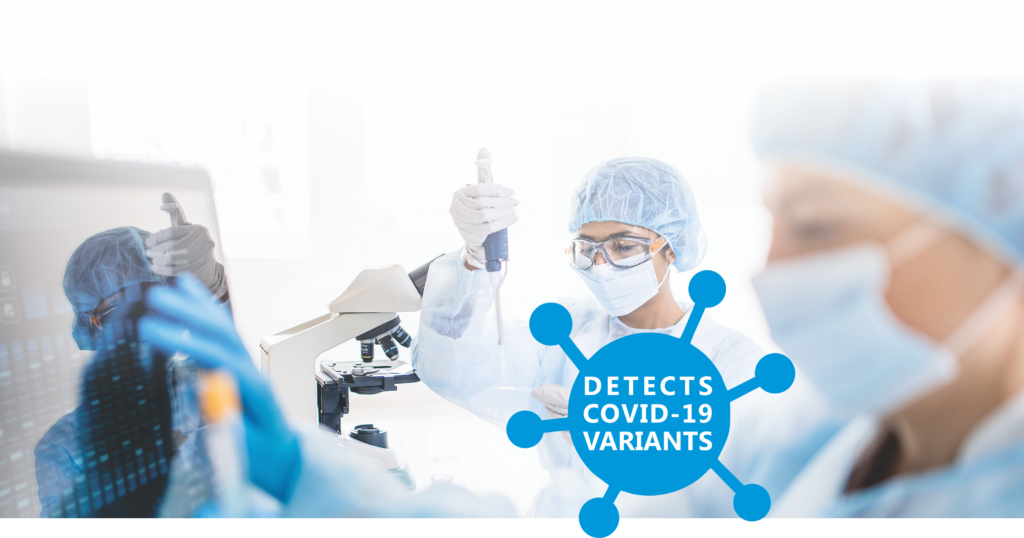
Background
- Mutations are the norm for viruses, especially RNA viruses like SARS-CoV-2. SARS-CoV-2 has been mutating throughout the pandemic. Recently a deletion mutation in the S-gene of SARS-CoV-2 has emerged. The mutation is a 6-nucleotide deletion (21765-21770) within the S-gene that results in the deletion of two amino acids at sites 69 and 70 in the spike protein. The new deletion mutation is commonly referred to as 69-70del. The 69-70del has been observed in multiple variant lineages of SARS-CoV-2, including the so called “U.K. variant” technically known as the B.1.1.7 variant or UK VOC-202012/01. The B.1.1.7 variant, which has been detected in the United States, has at least 17 mutations, including 69-70del, and has been linked to an increase in transmissibility.[1]
How Does 69-70del Impact the Linea COVID-19 Assay Kit?
- The Assay Kit is a multi-target assay with two targets (S1 and S2) within the SARS-CoV-2 S-gene. In silico and clinical sample analysis results show that the S1 target of the Assay Kit experiences “drop out” in the presence of 69-70del. The Assay Kit’s S2 target is not impacted by 69-70del. The overall sensitivity of the Assay Kit is not impacted.
How Does 69-70del Impact the Linea COVID-19 Assay Kit Results?
- The Linea COVID-19 Assay Kit was designed as a multi-target assay in anticipation of the naturally occurring viral mutations common in RNA viruses such as SARS-CoV-2. The advantage of a multi-target assay is built in redundancy with two different S-gene targets.
- S1 target dropout in the presence of 69-70del does not mean a result is negative. The Assay Kit, when used as per our Instructions for Use (IFU), provides for a positive result to be called if one of the two assay targets are detected. Since there is no 69-70del related impact on the Assay Kit’s S2 target, a sample with S1 target dropout can still be called positive.
- To date, neither 69-70del, nor any other mutation has been found to impact test results obtained from the Assay Kit. S1 target dropout in the presence of 69-70del does not cause a decrease in the overall sensitivity of the Assay Kit.
Can the Linea COVID-19 Assay Kit Be Used for SARS-CoV-2 Variants That Contain 69-70del, Including the B.1.1.7 Variant?
- While the Assay Kit is not currently authorized to detect 69-70del, the U.S. FDA has stated that S1 target dropout in a positive sample tested with the Assay Kit may be indicative that the sample contains a SARS-CoV-2 variant with 69-70del, which includes, but is not limited to the B.1.1.7 variant.[2] Thus, S1 target dropout in a positive sample tested with the Assay Kit provides for a low-cost and rapid indication of new potential SARS-CoV-2 variants for further investigation, especially if genetic sequencing capacity is limited.
- If S1 target dropout in a positive sample tested with the Assay Kit is observed, the FDA recommends that the sample should be considered for further characterization via genetic sequencing. The Assay Kit has been used to identified SARS-CoV-2 variants via S1 target dropout that were confirmed to contained the 69-70del via genetic sequencing.[3]
What Are the Recommendations for Current Users of the Linea COVID-19 Assay Kit?
- Since there are two targets used in the Assay Kit and a positive result is called when only one of the two targets are detected (per our IFU), no adaptation to the Assay Kit or change in use are necessary at this time.
What is Applied DNA Sciences Doing to Monitor S-gene Mutations Impacting the Linea COVID-19 Assay Kit?
- We regularly monitor public database updates to assess the impact of new S-gene mutations on the Assay Kit. To date, there have been no reports of Assay Kit test results being impacted due to the 69-70del.
[1] https://www.cdc.gov/coronavirus/2019-ncov/more/science-and-research/scientific-brief-emerging-variants.html[2] https://www.fda.gov/medical-devices/letters-health-care-providers/genetic-variants-sars-cov-2-may-lead-false-negative-results-molecular-tests-detection-sars-cov-2[3] https://www.fda.gov/medical-devices/letters-health-care-providers/genetic-variants-sars-cov-2-may-lead-false-negative-results-molecular-tests-detection-sars-cov-2


